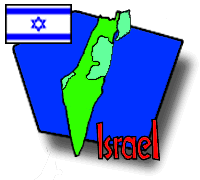

(29/3/98) For the Jews Caesarea symbolized Roman rule of Judea. While the Temple in Jerusalem lay in ruins the theaters and amphitheaters of Caesarea were crowded with spectators. Often the theme of the play was the Jew, mocked and tortured for amusement.
Caesarea's success, however, came to an end in the 3rd Century CE with a small shift in the "plates" supporting the East Coast of the Mediterranean. A small matter in Geological terms but catastrophic for the inhabitants of this coast. The harbors of coastal cities, from Gaza in Judea to Aspendos in Turkey, vanished under the sea.
These sunken harbors are popular diving areas and the subject of underwater archaeology.
The Jewish people saw the catastrophic destruction of Caesarea as a sign of hope. At that time there was a popular Jewish saying "when Caesarea stands Jerusalem will fall, when Caesarea falls Jerusalem will stand". Caesarea had fallen now it was time for Jerusalem to be rebuilt.
Arriving at Caesarea by tourist bus from Ben Gurion airport along a super modern highway doesn't help us to imagine what this city was like in the 2nd Temple period, 1st century BCE. In those days we'd have come to Caesarea by wagon, or by ship.
Ships had been anchoring off the shore here for thousands of years before Herod the Great for two reasons:
1) There was a small Phoenician harbor here, built at least a thousand years before Herod the Great, known as Straton's Tower. Remains of this tower have been found here by archaeologists. It's star shaped and its real name was the Tower of Astarte, the Phoenician goddess of fertility. "Straton" is the Latin version of "Astarte".
2) Good roads connected this harbor with the rich agricultural hinterland of Samaria, the fertile Jezreel valley and the great sea route, "the Via Maris".
The richness of Caesarea depended on its harbor. It was known as Sebastos, the harbor of Sebastia because this was the origin of most of the products exported from the harbor. Wagons from Sebastia, heavily laden with dried figs, almonds, jars of olive oil, date honey and wine, came trundling in to be offloaded at the harbor and in the markets.
Without a harbor ships could only anchor here in the Summer time, when the sea was calm. A proper harbor made it possible for ships to be loaded while they lay safely tied up protected from pirates and the stormy Winter months, when in any case the sea was too rough for sailing.
Ships loading goods here came from every corner of the Mediterranean basin and further. Their owners paid high prices for the anchorage and were well rewarded because their ships would be first at the markets of Europe in springtime. The products they brought would fetch higher prices than those arriving later would.
While the ships were being loaded sailors crowded the temples, gymnasiums, theaters, amphitheaters and hippodromes of Caesarea in search of spiritual inspiration, entertainment and exercise.
Wagons crowded the roads. Some carried travelers on their way to the markets of Caesarea. Others wanted to visit the Temples there. Others the Hippodrome or the theatre. Others on their way to board a ship for a long journey to Rome or some other distant city.
![]() Check out some of Leon's photos
Check out some of Leon's photos
Leon Gork (Tour Guide)
P.O.Box 4354 Jerusalem 91042
Tel/Fax 02 5810732....Cel.053 801867/823905
e-mail.leongork@netvision.net.il
Treasurer:Jerusalem for Bicycles
 |
 |
 |
 |
 |
|
Itinerary/ Journal |
Discussions |
About Israel |
eDscape Projects |
Scrapbook |
|
|
|
|
|
|
|
Copyright 1997-2004 BikeAbout. All rights reserved.